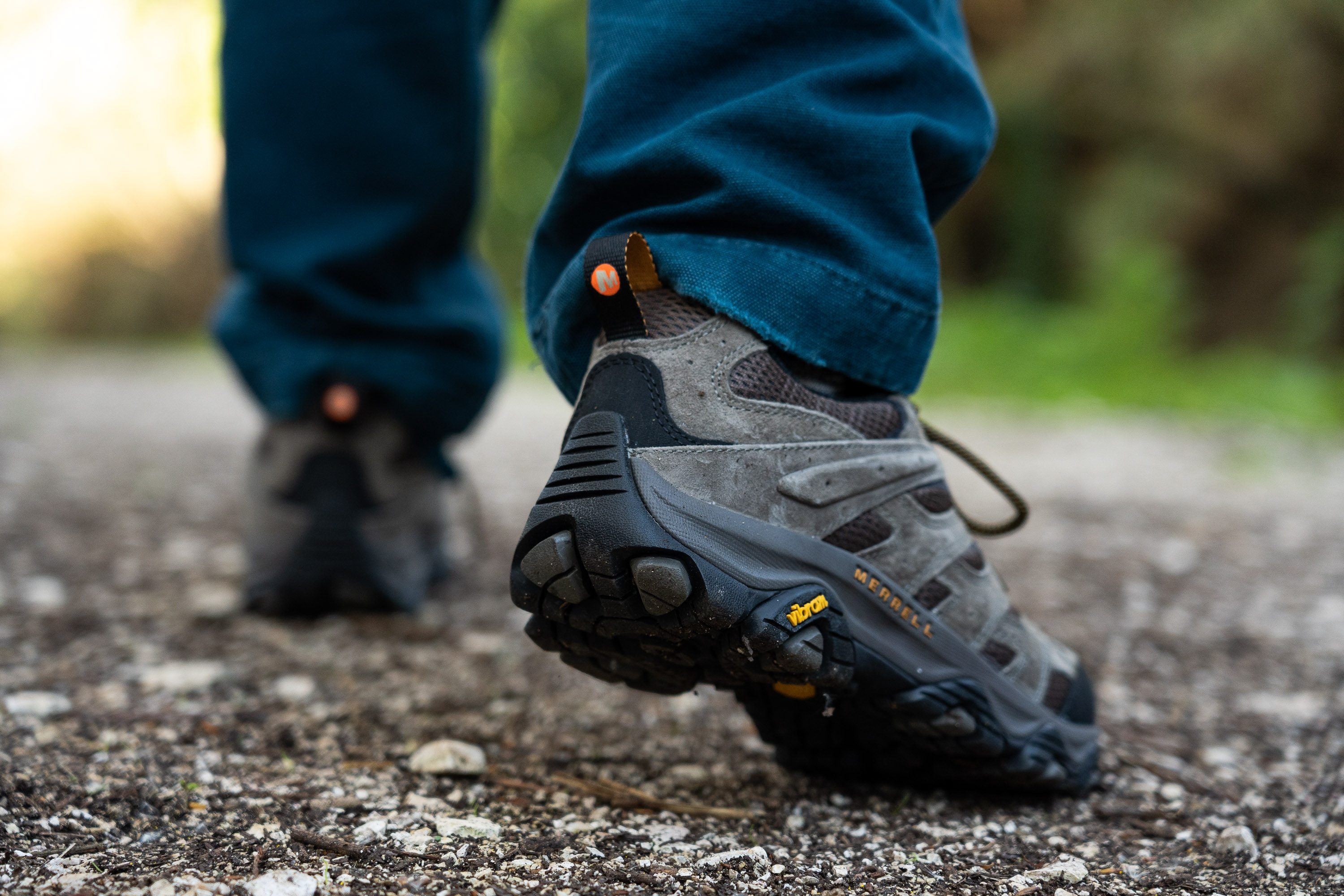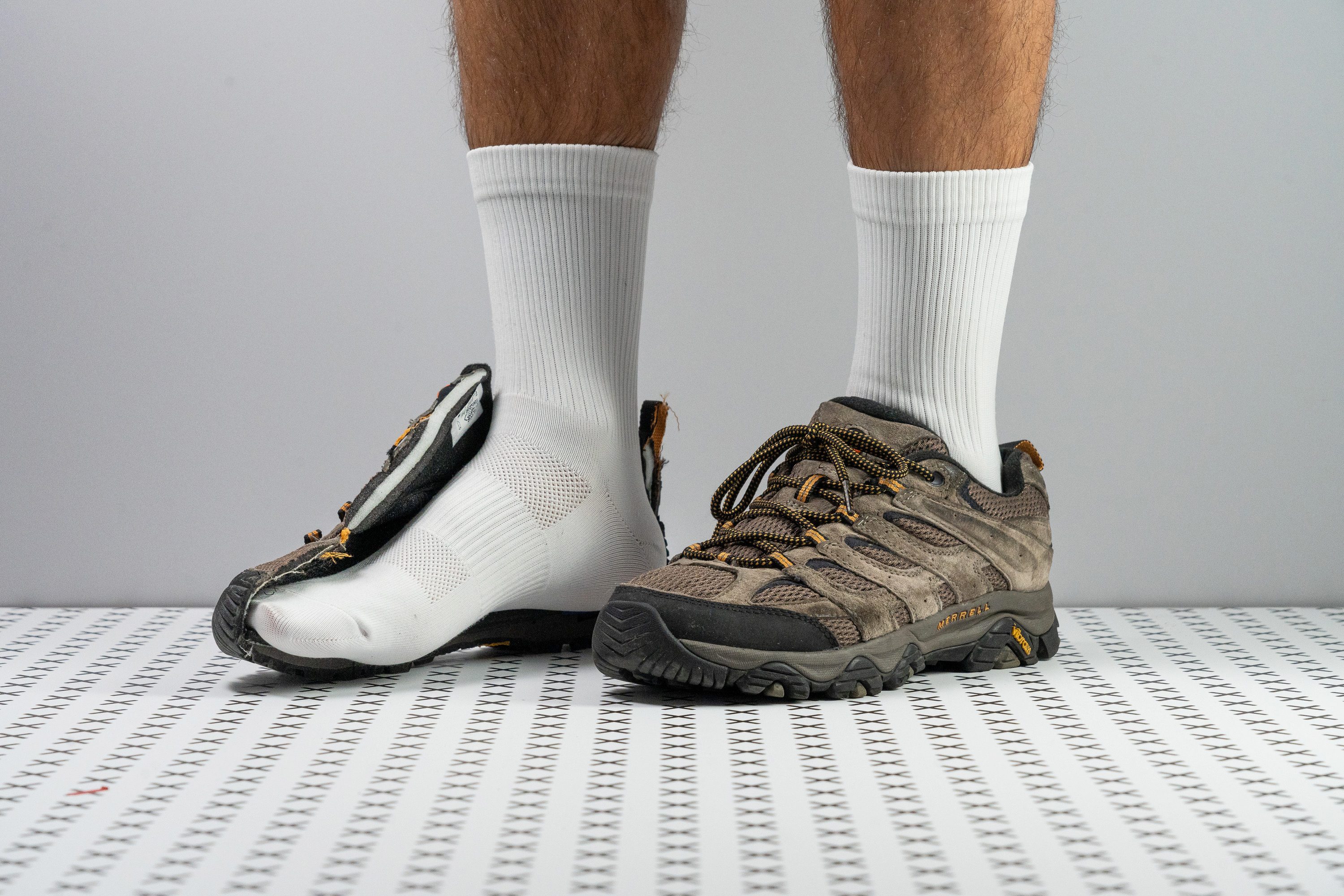Our verdict
- Top pick in best Merrell hiking shoes
- Top pick in best summer hiking shoes
Pros
- Supremely comfy
- Zero break-in
- Boss-level support
- Solid grip on mixed terrain
- Stable platform
- Responsive cushioning
- Fits various foot shapes
- Cheaper than average
- Recycled materials
Cons
- Heavier than average
- Not quite sleek-looking
Audience verdict
- Top 20% in hiking shoes
- Top 15% in Merrell hiking shoes
- Top 3% most popular hiking shoes
Comparison
The most similar hiking shoes compared
+ + Add a shoe | |||||
|---|---|---|---|---|---|
| Audience score | 89 Great! | 80 Good! | 73 Good! | 79 Good! | |
| Price | £110 | £110 | £140 | £110 | |
| Trail terrain | Technical | Technical | Moderate | ModerateTechnical | |
| Shock absorption | Low | Low | Low | Low | |
| Energy return | Moderate | Moderate | Moderate | Moderate | |
| Weight lab Weight brand | 15.3 oz / 434g 16.2 oz / 460g | 13.9 oz / 393g 14 oz / 397g | 12.9 oz / 367g 12.3 oz / 350g | 13.4 oz / 380g 13.4 oz / 380g | |
| Lightweight | ✗ | ✓ | ✓ | ✓ | |
| Breathability | Breathable | Warm | Breathable | Warm | |
| Use | Day HikingBeginners | Day HikingBeginners | Day HikingBeginners | Day HikingBeginners | |
| Orthotic friendly | ✓ | ✓ | ✓ | ✓ | |
| Drop lab | 11.2 mm | 14.1 mm | 15.5 mm | 14.0 mm | |
| Size | True to size | True to size | Slightly small | True to size | |
| Midsole softness | Firm | Firm | Balanced | Firm | |
| Difference in midsole softness in cold | Normal | Small | Normal | Small | |
| Torsional rigidity | Moderate | Moderate | Stiff | Moderate | |
| Heel counter stiffness | Flexible | Moderate | Moderate | Flexible | |
| Stiffness | Flexible | Flexible | Moderate | Flexible | |
| Outsole hardness | Average | Very hard | Average | Hard | |
| Material | LeatherMesh | MeshSuede | - | MeshSuede | |
| Season | SummerAll seasons | Winter | SummerAll seasons | Winter | |
| Toebox durability | - | Very good | Good | Very good | |
| Heel padding durability | - | Bad | Decent | Bad | |
| Outsole durability | - | Decent | Decent | Decent | |
| Width / fit | Medium | Medium | Wide | Wide | |
| Toebox width | Medium | Medium | Medium | Medium | |
| Lug depth | 4.8 mm | 4.3 mm | 4.5 mm | 4.0 mm | |
| Heel stack lab | 31.7 mm | 30.8 mm | 34.4 mm | 30.6 mm | |
| Forefoot | 20.5 mm | 16.7 mm | 18.9 mm | 16.6 mm | |
| Widths available | NormalWide | NormalWide | Normal | Normal | |
| Technology | Vibram | - | Ortholite | - | |
| Heel tab | Finger loop | Finger loop | Finger loop | Finger loop | |
| Removable insole | ✓ | ✓ | ✓ | ✓ | |
| Ranking | #7 Top 20% | #28 Bottom 20% | #32 Bottom 8% | #29 Bottom 17% | |
| Popularity | #1 Top 3% | #17 Top 49% | #14 Top 40% | #31 Bottom 11% |
Cushioning
Shock absorption
Released in 2022, the Moab 3 can feel dated compared to some of the advanced hiking shoes of today but it still delivers good impact protection, especially for its moderate price point.
Measuring the shoe's shock absorption at 98 SA, we found it to be slightly lower than average. But it's not critical as you still get the necessary buffer from the ground even for all-day hiking with a heavy load.
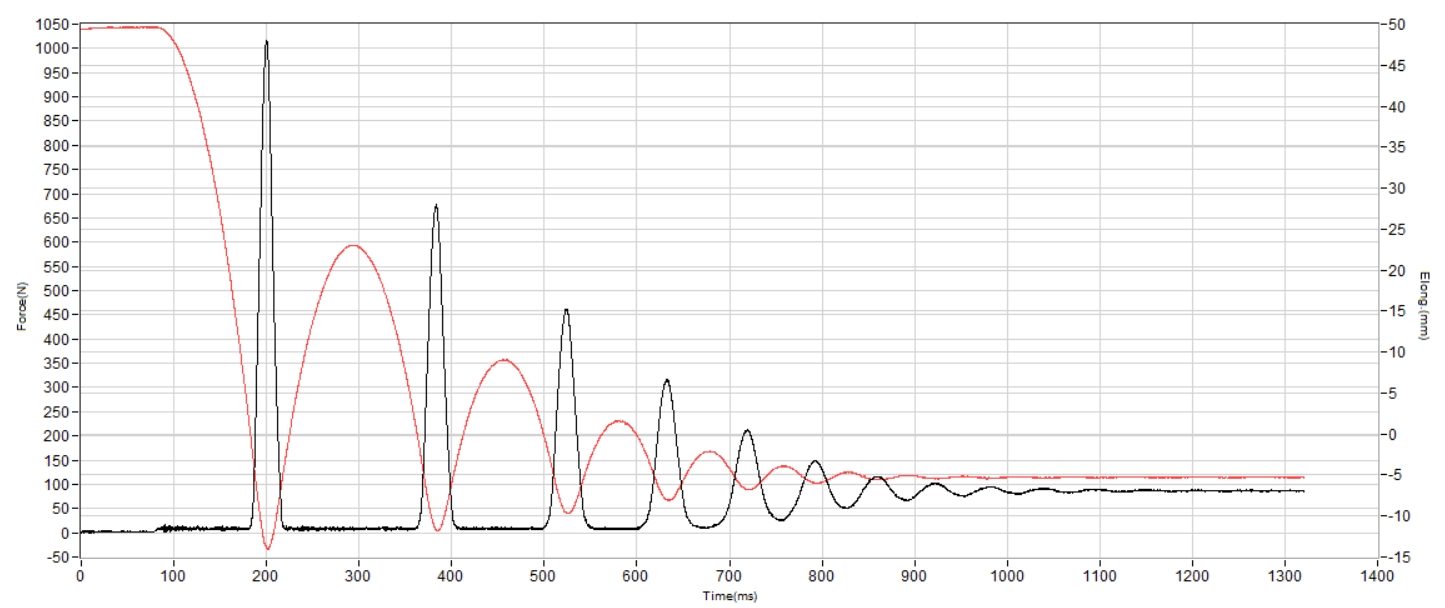
| Moab 3 | 98 SA |
| Average | 104 SA |
Energy return
The shoe's ride feels more enjoyable thanks to the responsive nature of its midsole foam. Showing a slightly above-average energy return of 54%, the Moab 3 adds a bit of pep to the step.
| Moab 3 | 54.4% |
| Average | 50.2% |
Midsole softness
Based on our durometer measurements, the Moab 3 packs a firmer type of midsole foam at 33 HA.
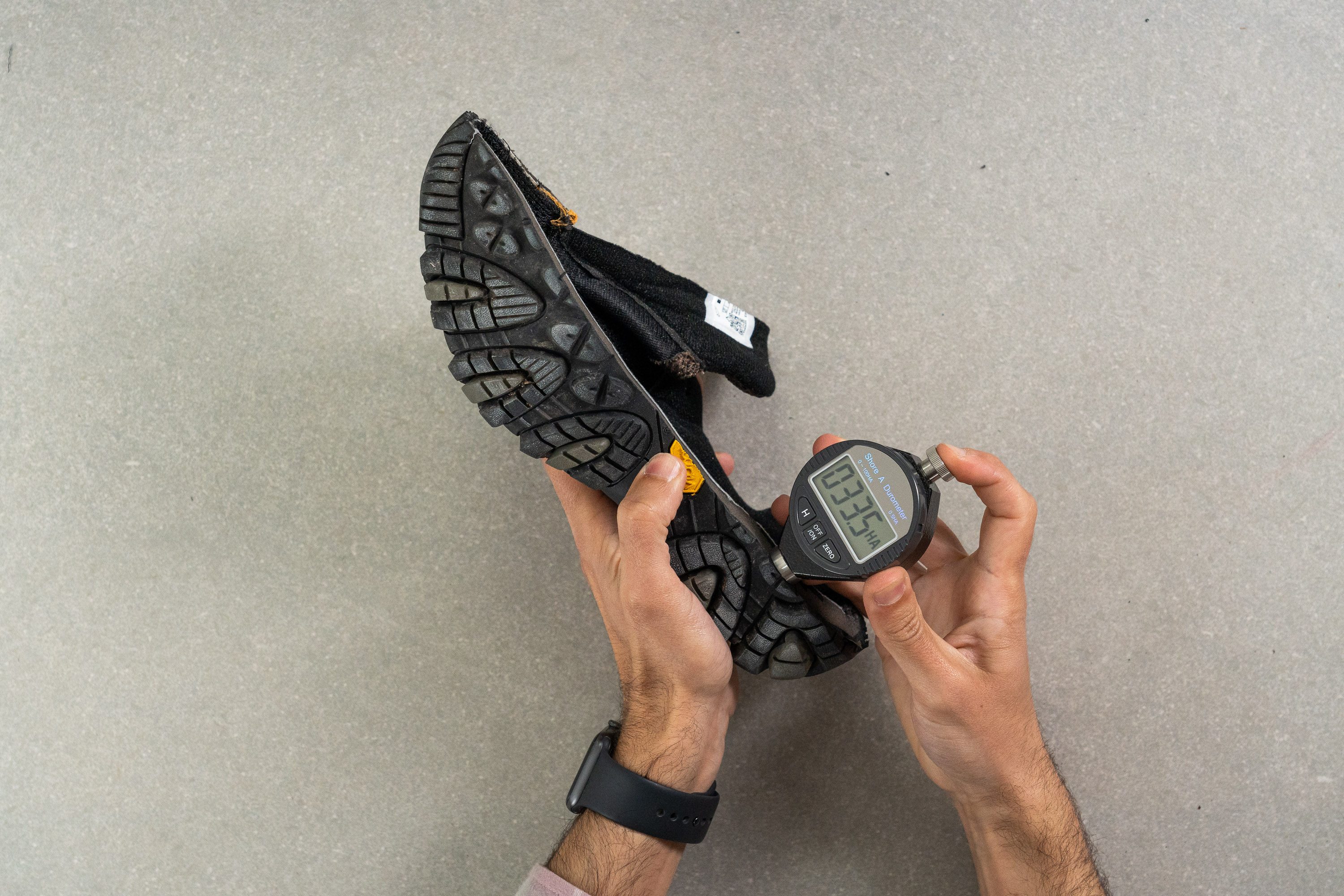
It is not like walking on clouds but you get a fine balance of stability and cushioning in this Merrell shoe.
| Moab 3 | 32.9 HA |
| Average | 27.0 HA |
Size and fit
Size
Merrell Moab 3 fits true to size (213 votes).
Width / Fit
UpdatedThe Merrell Moab 3 offers a predictable true-to-size fit which caused us no discomfort or hotspots from day one.
At its widest part (ball of foot area), our calliper measured the Moab 3's gel mould at 93.8 mm. This is on par with the category average and is perfect for a medium-width foot.
But if you are a wide footer, Merrell kindly provides the Moab 3 in a wide version as well.
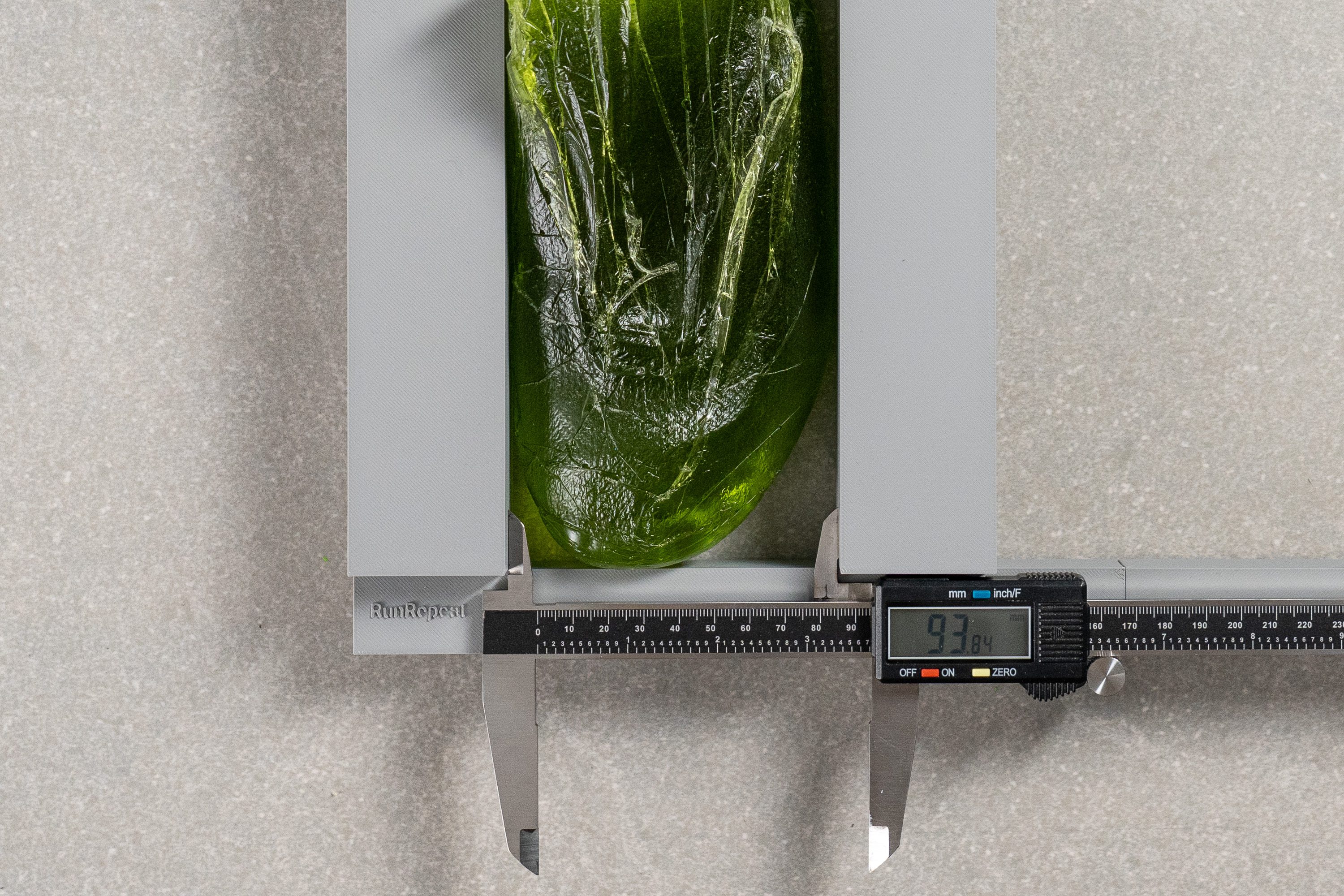
| Moab 3 | 93.8 mm |
| Average | 94.1 mm |
Toebox width
UpdatedIf you enjoy having some extra wiggle room for your toes, we've got good news!
This Merrell shoe is pretty generous with its toebox space showing 74.8 mm of width in the big toe area. This is notably roomier compared to the average hiking shoe.
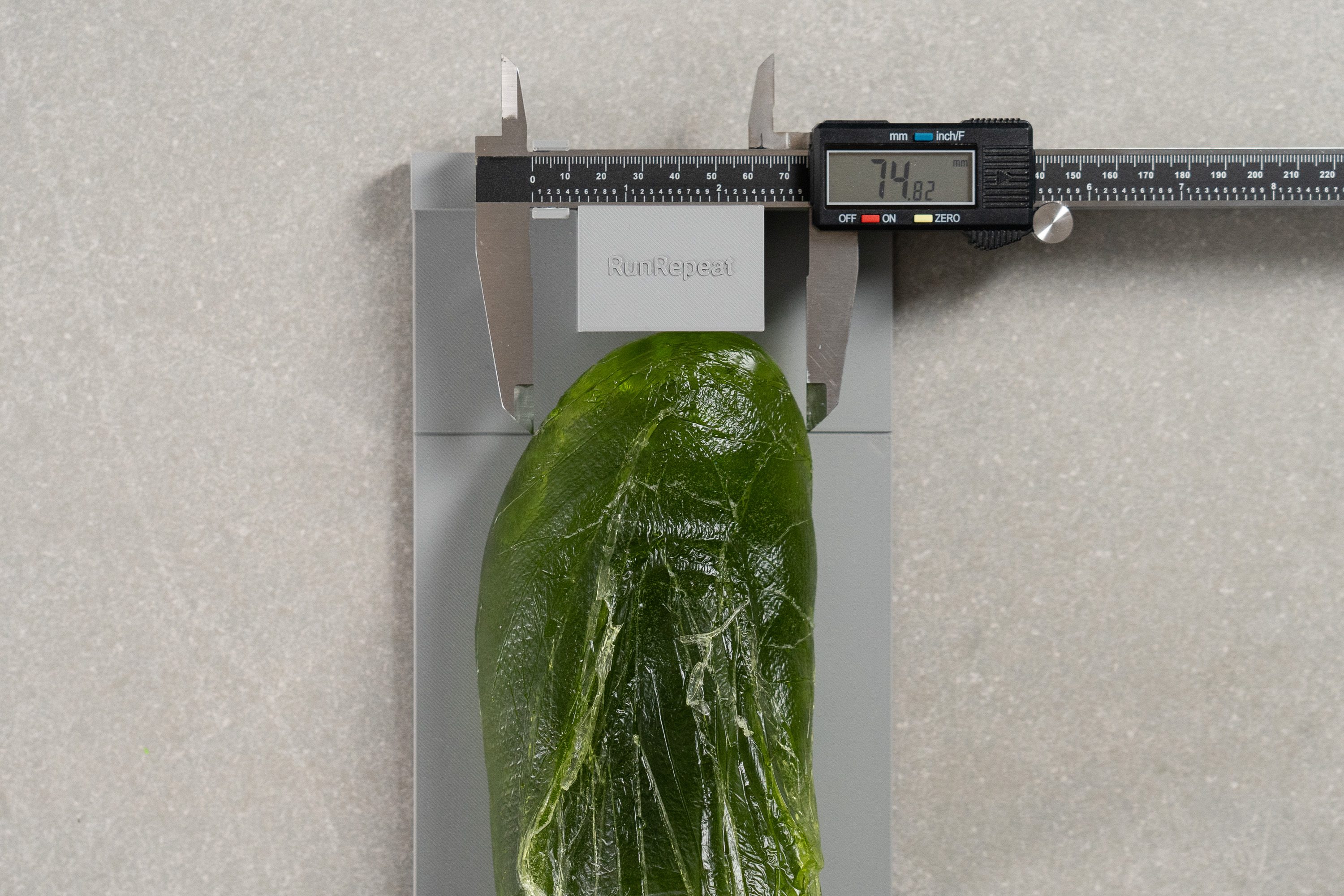
| Moab 3 | 74.8 mm |
| Average | 72.5 mm |
Toebox height
The shoe's toebox volume is also increased by its above-average toebox height of 29.5 mm. This makes the Moab 3 more accommodating for toe swelling, claw or hammer toes, and black or ingrown toenails.
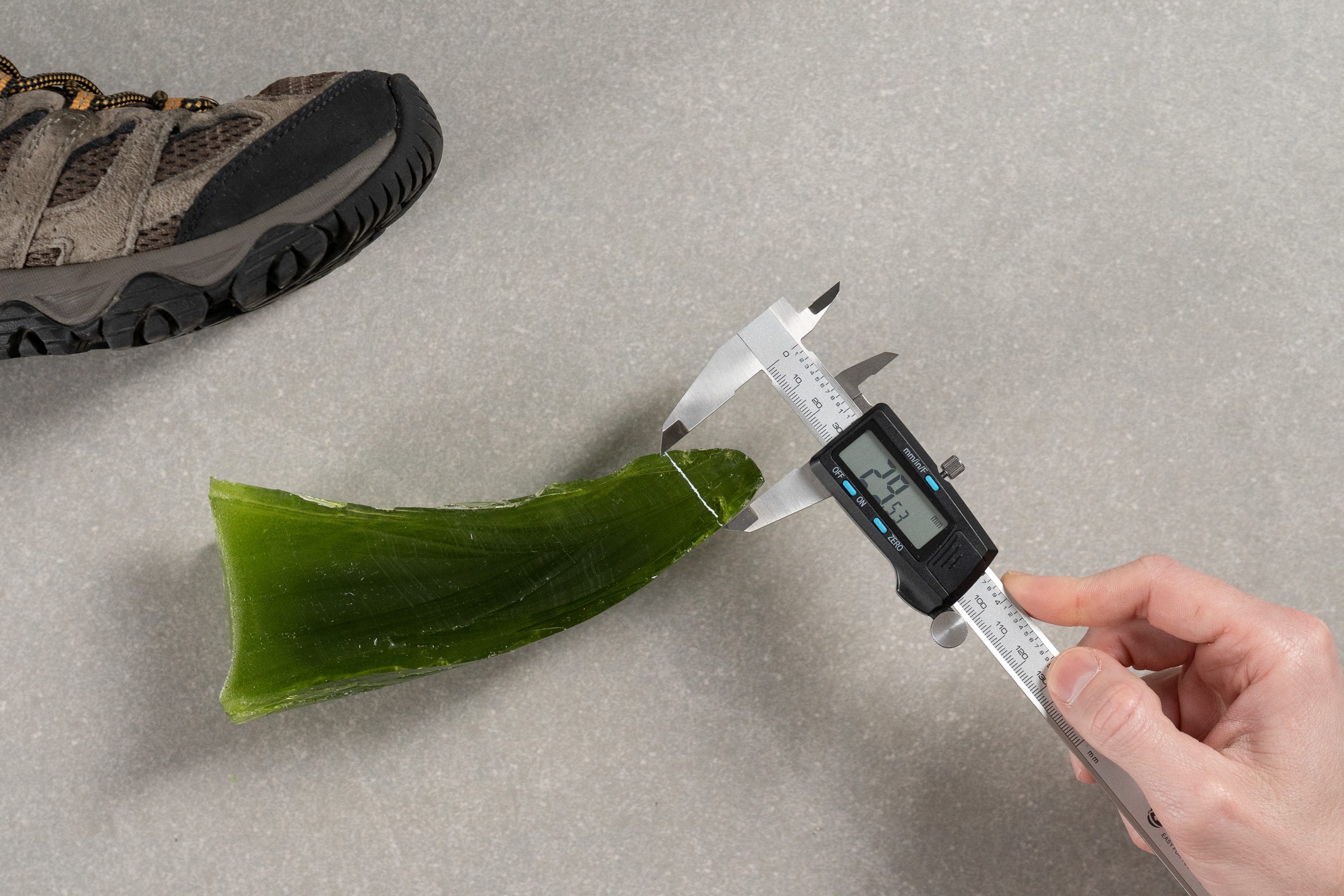
| Moab 3 | 29.5 mm |
| Average | 28.0 mm |
Traction / Grip
Forefoot traction
Just like the Moab 3 itself, its Vibram TC5+ rubber outsole is meant for moderate types of terrain.
It's not the tackiest companion on slippery rocks but it has a decent friction score of 0.29. That's a standard level of grip that makes a hiking shoe feel surefooted on dry rocks and boulders.
| Moab 3 |
Lug depth
According to Merrell's specs, the Moab 3 is studded with 5-mm deep lugs. We are happy to confirm that statement with a calliper measurement of 4.8 mm.
This Merrell shoe can handle varied terrain with a little bit of everything - mossy rocks, downed trees, and even light mud. However, we wouldn't recommend it for technical patches, scrambling, or deep mud (the lug spacing is not optimal for shedding dirt).
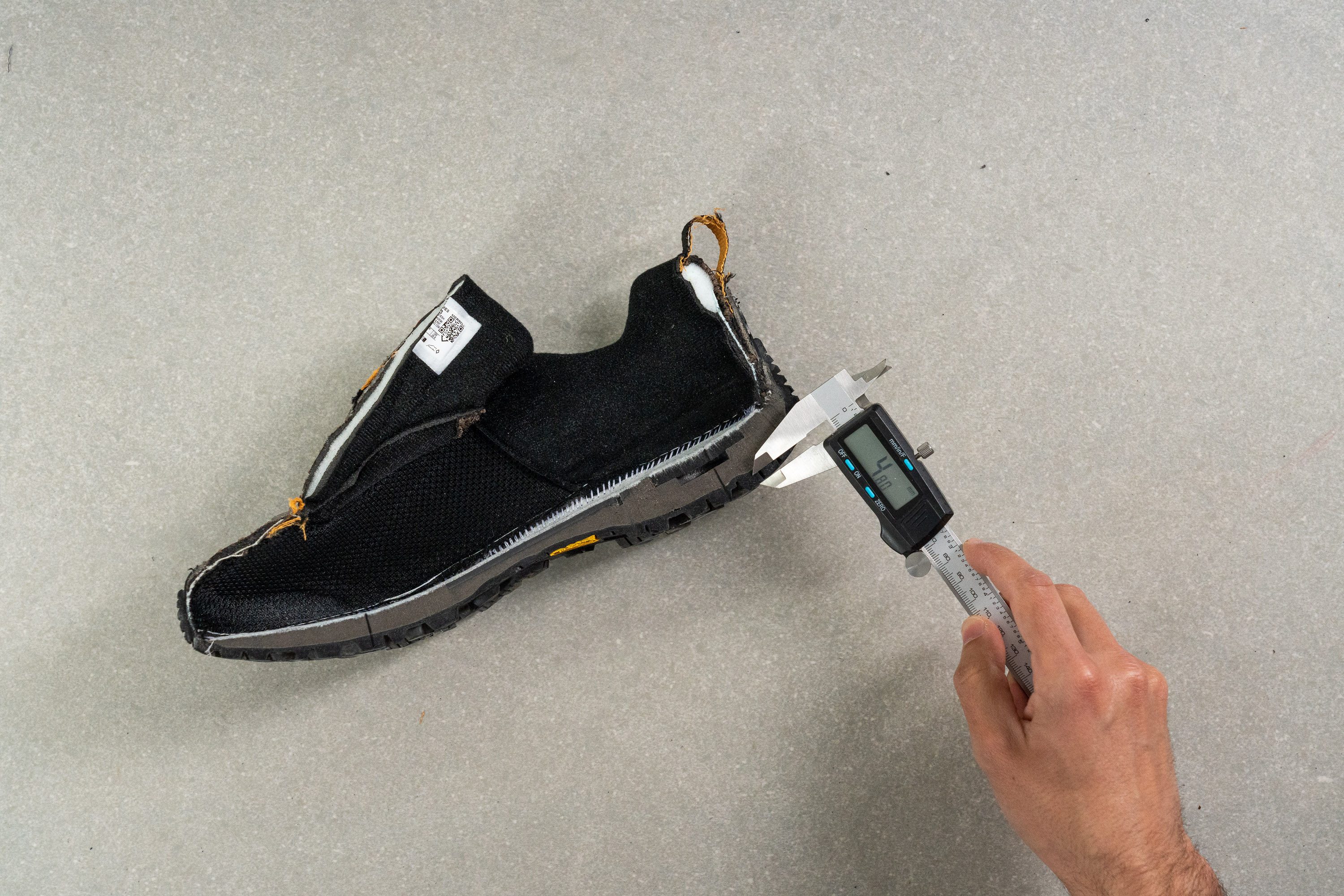
| Moab 3 | 4.8 mm |
| Average | 4.0 mm |
Outsole design
The Merrell Moab 3 features wide and smooth lugs that don't feel off on hard-packed terrain or urban surfaces.
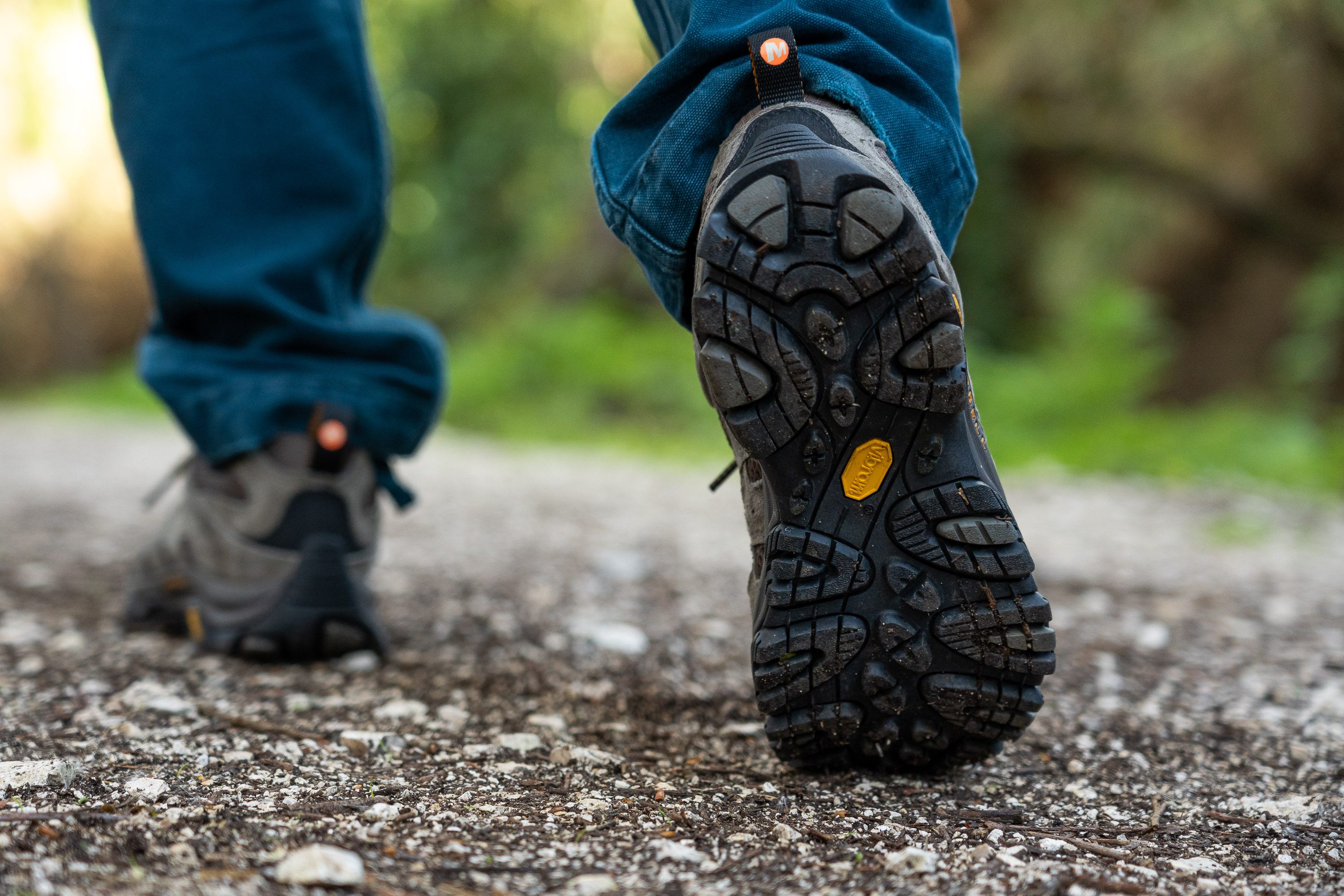
The shoe's entire outsole is lined with long and deep sipes that shed water from the bottom of the shoe for better traction on wet surfaces.
Its heel brake is not as pronounced as in the more technical hiking shoes but it provides essential stopping power upon descents.
Flexibility / Stiffness
The Merrell Moab 3 is very far from the traditionally rigid hiking footwear. We discovered that the shoe's flexible design makes it very smooth-walking.
To check the shoe's flexibility, we measured its resistance to forefoot bending in a specialised shoe flexing tester. It turned out that the Moab 3 needed significantly less force (12.9N) to bend by 30 degrees than an average hiking shoe!
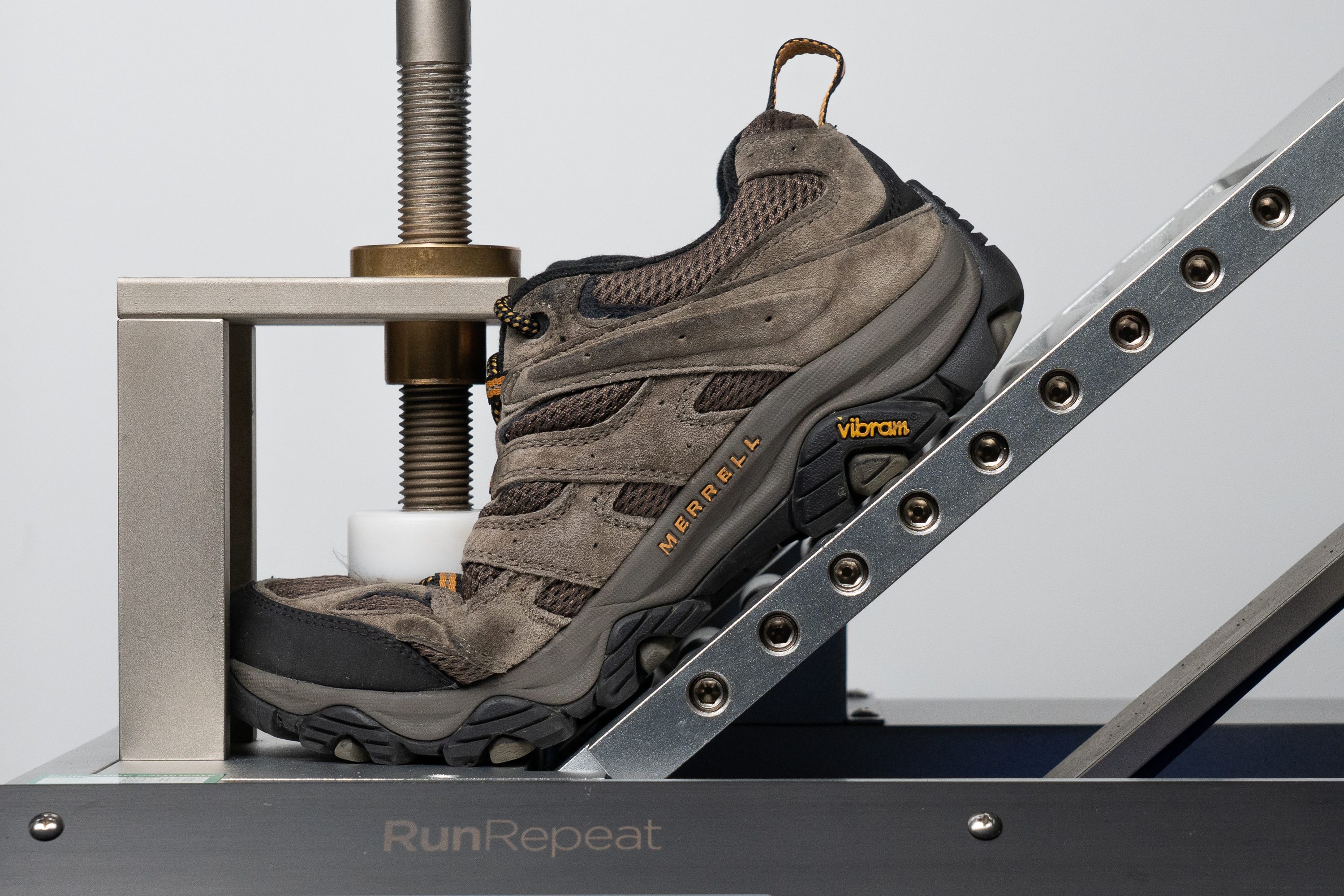
| Moab 3 | 12.9N |
| Average | 18.3N |
Who should buy the Merrell Moab 3
The Moab 3 is a fantastic continuation of Merrell's Moab (Mother-of-all-boots) series. Buy it if:
- You're a sunny-day adventurer who needs a pair of breathable hikers.
- You want a hiking shoe that offers day-one comfort.
- You want to get the most out of £110.
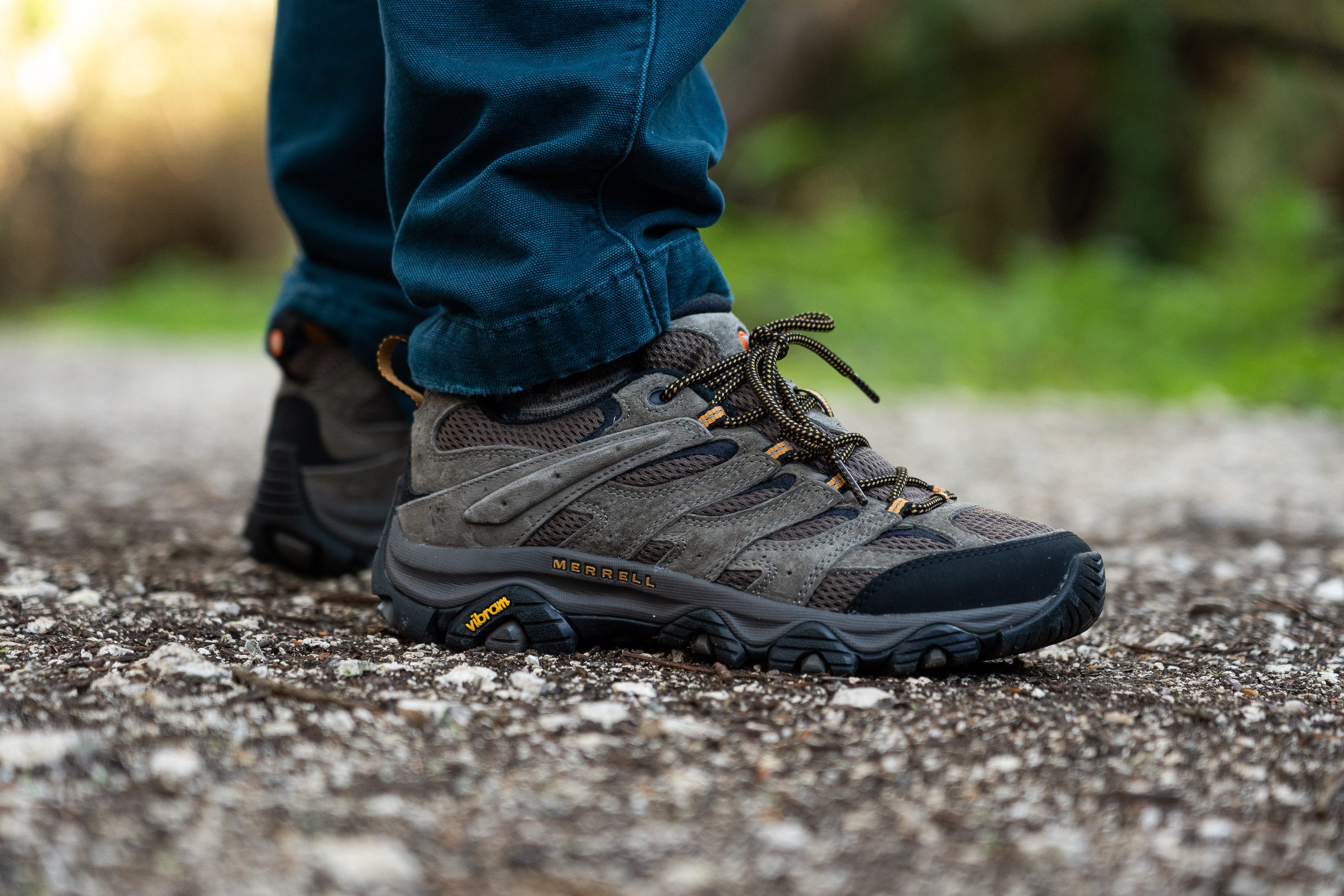
Who should NOT buy it
If you aren't ready to give up the feeling of light and nimble feet, we recommend the Salomon X Ultra 4 instead. With similar characteristics, it is nearly 100g(!) lighter than the Moab 3.
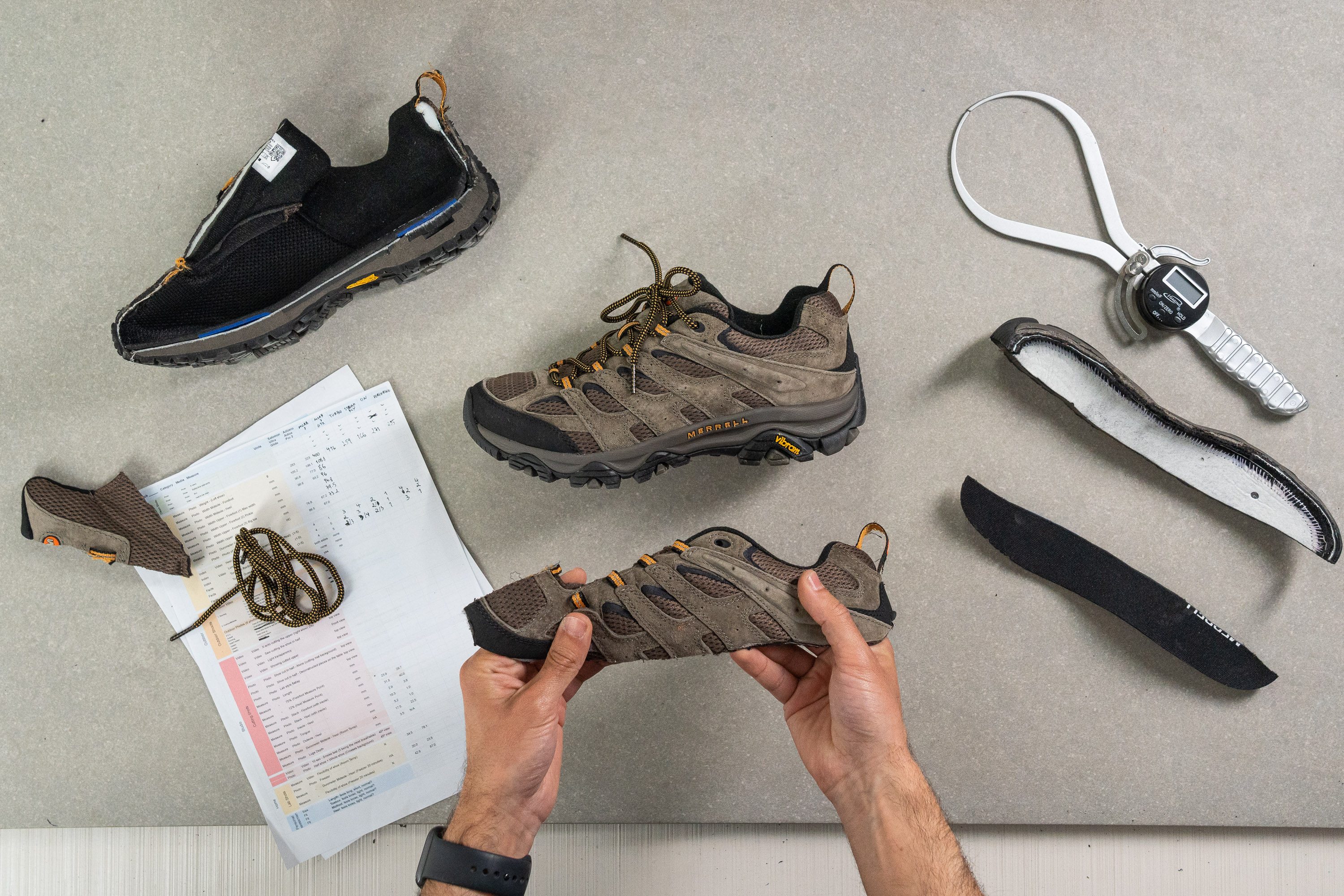
A ventilator for your summer hikes
If Merrell followed the naming pattern of previous models, this shoe would have been called the Moab 3 Ventilator. And for a good reason. We are happy with the level of breathability provided by this hiking shoe.
Using a smoke-pumping machine, we checked how well the shoe's mesh upper breathes. A large amount of smoke passing through the fabric makes it clear - the Moab scores 4 out of 5 on our breathability test!
If you are interested, the shoe is also available in the GTX version: the Moab 3 GTX (£160, Gore-Tex membrane).
Surprisingly, the shoe's tightly woven mesh turned out to be effective in water drainage, based on our experiences when we stepped into creeks. However, we do not recommend its prolonged exposure to rivers, puddles, and rain because the well-padded upper sponges it all up.
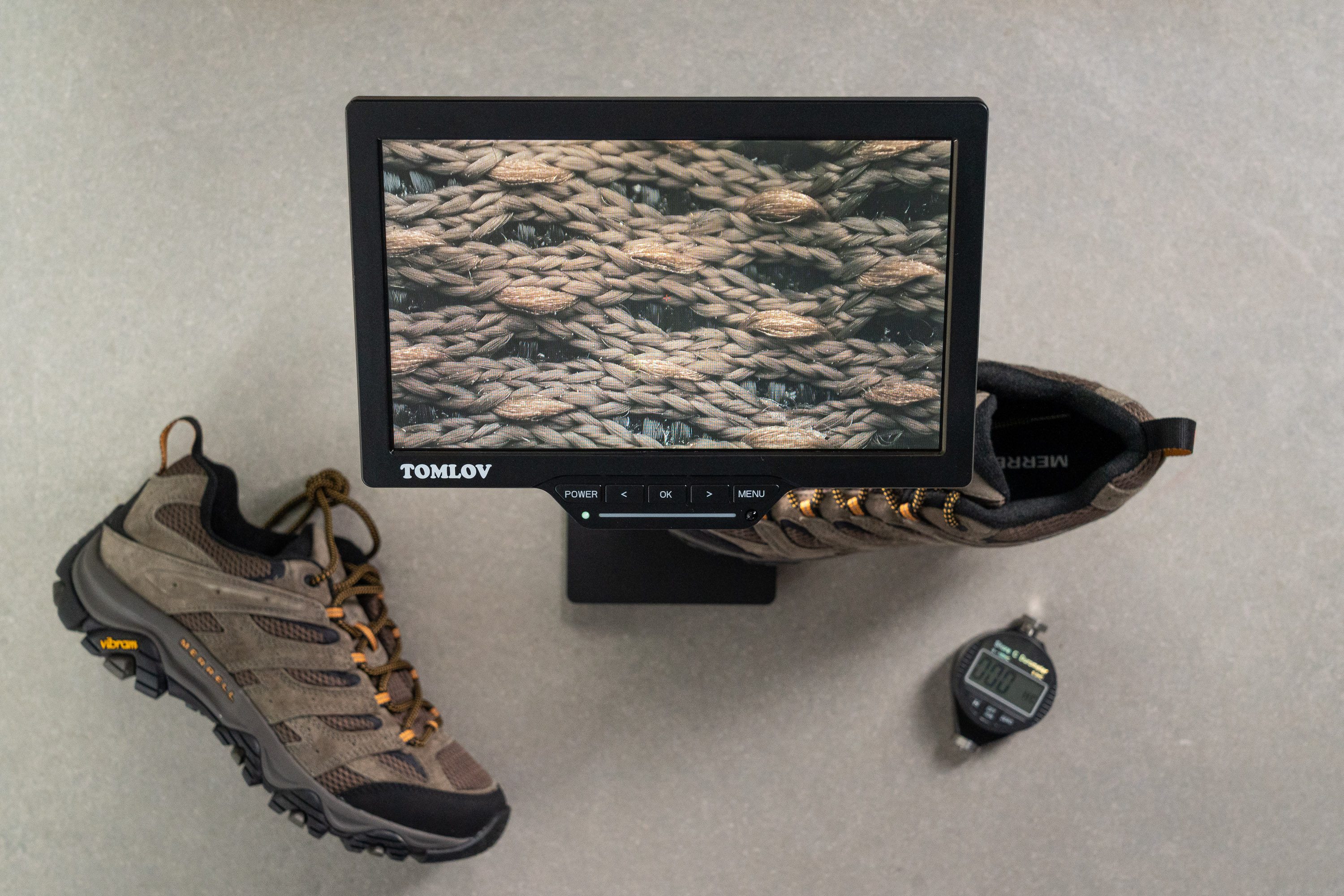
As you can see from our microscope shots, large ventilation pores are scattered throughout the fabric.
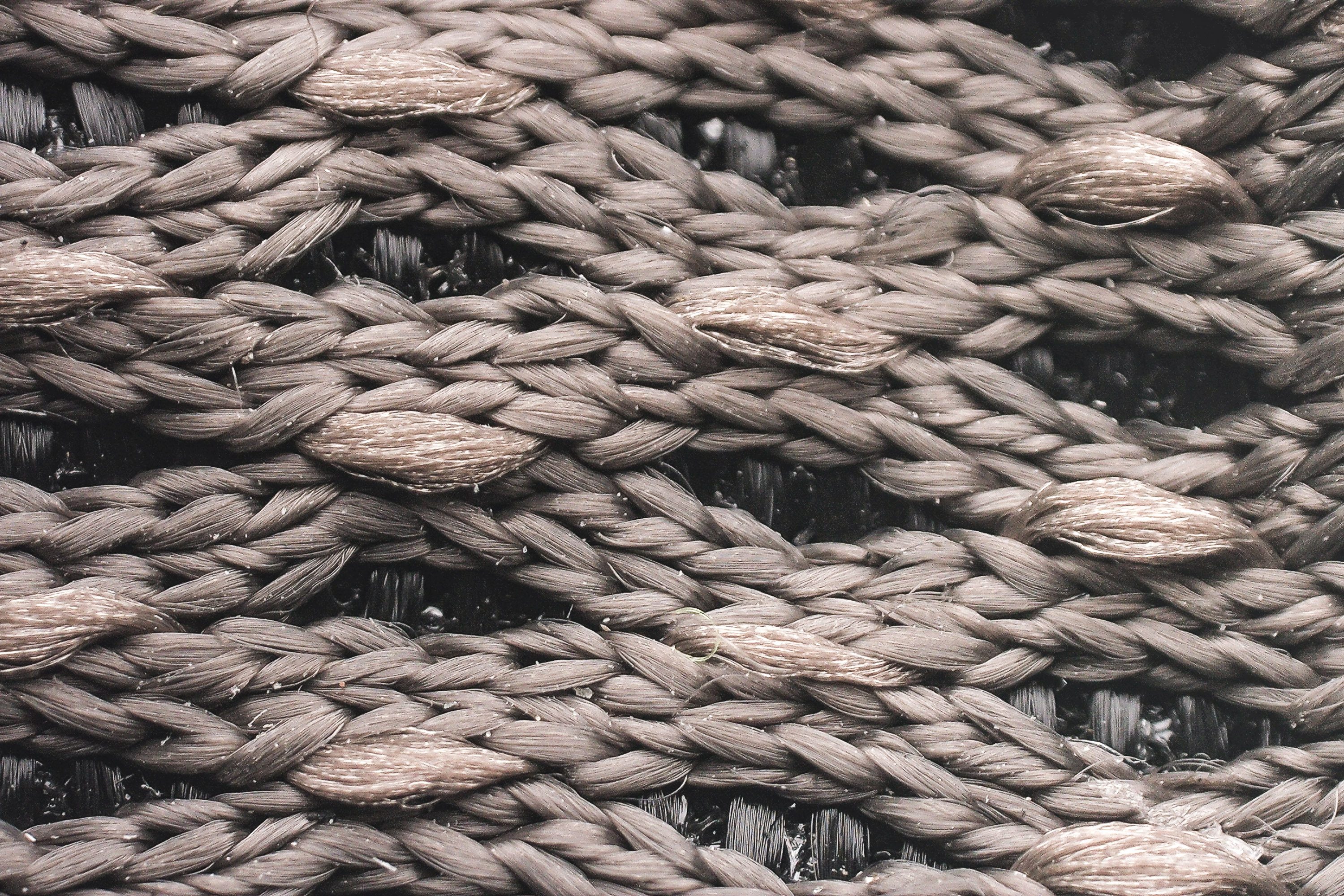
Will smother your feet in total comfort
There's mighty strong evidence that the Moab 3 is a real blessing comfort-wise.
We found it absolutely comfortable to wear right from the start and we owe a lot of this to the plush padding around our feet.
You can especially notice it in the tongue as it boasts a mighty thick padding of 14.5 mm! In most hiking shoes, the tongue normally stays below 10 mm.
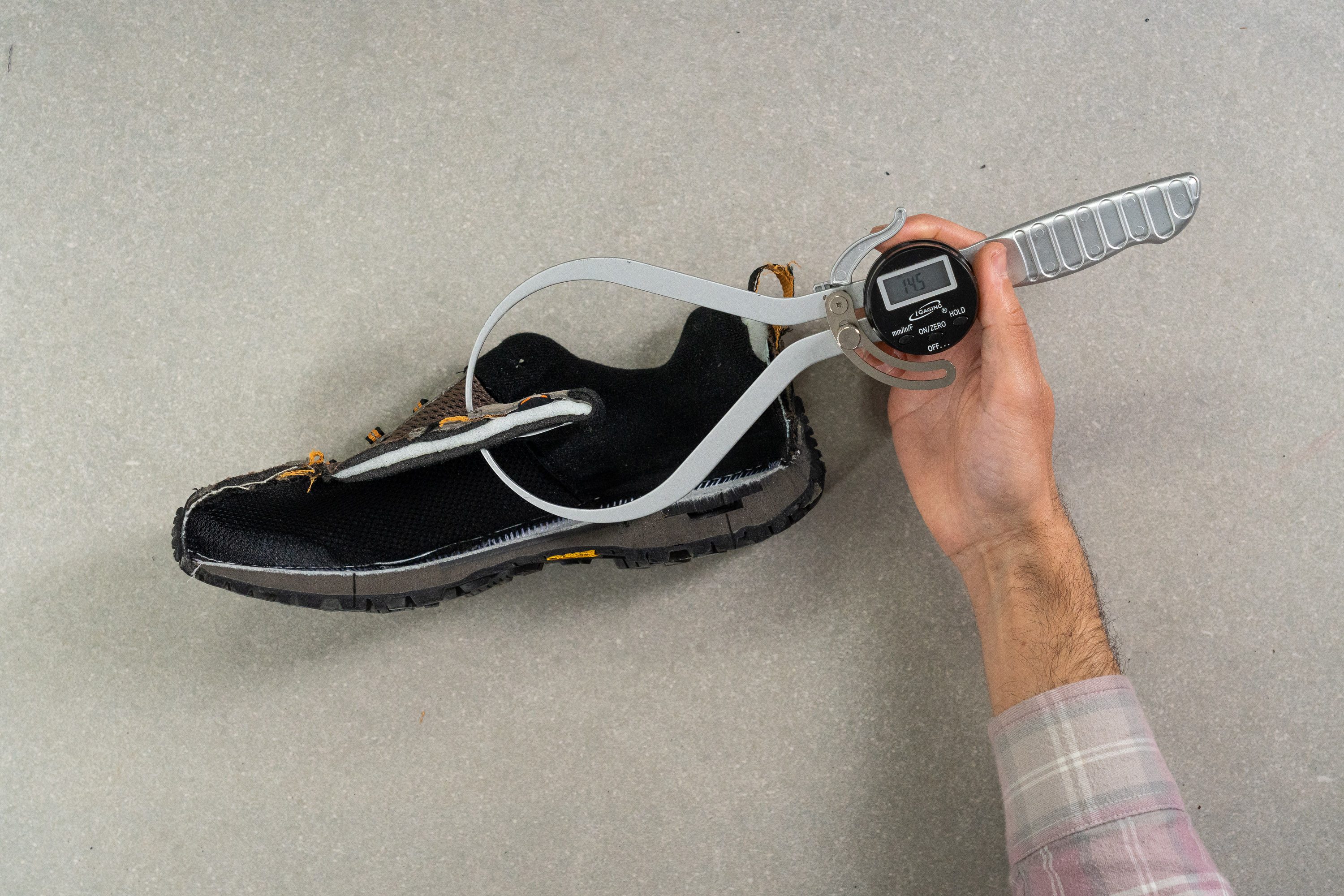
The insole thickness is consistent with the other Merrell Moab shoes we tested. We found it to be 4.4 mm in the heel.
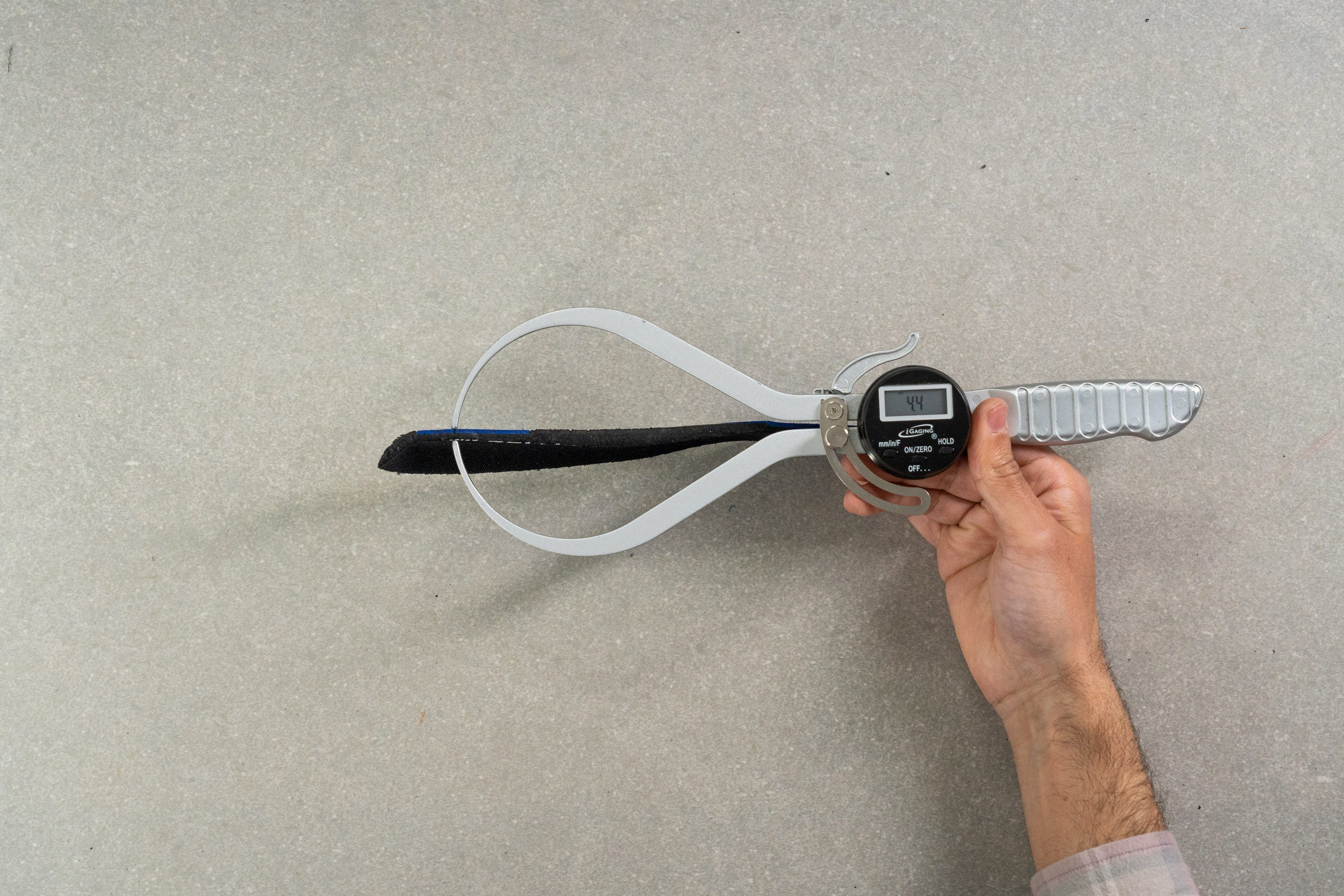
The heel drop matches the specs
According to Merrell's official product page, the heel-to-toe drop is 11.5 mm in this shoe. Equipped with a pair of callipers, we measured the shoe's heel stack at 31.7 mm and the forefoot one at 20.5 mm. This gave us a drop of 11.2 mm. Delivers on the promise!
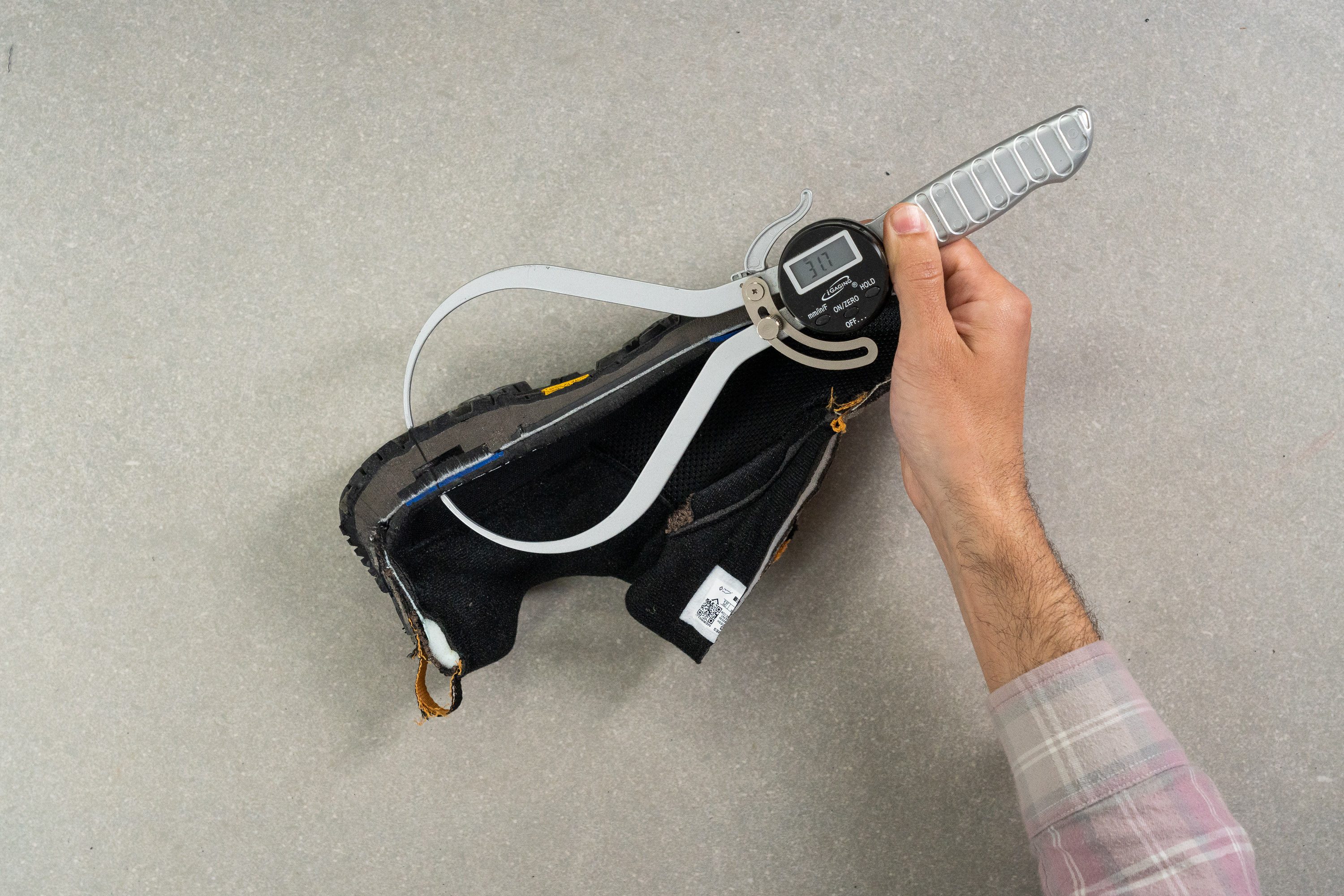
Moab 3 keeps its character in cold weather
We mimic cold-weather conditions by putting the Merrell Moab 3 in a freezer for 20 minutes. After that, the durometer and flexibility measurements are repeated to check how much stiffer the shoe got.
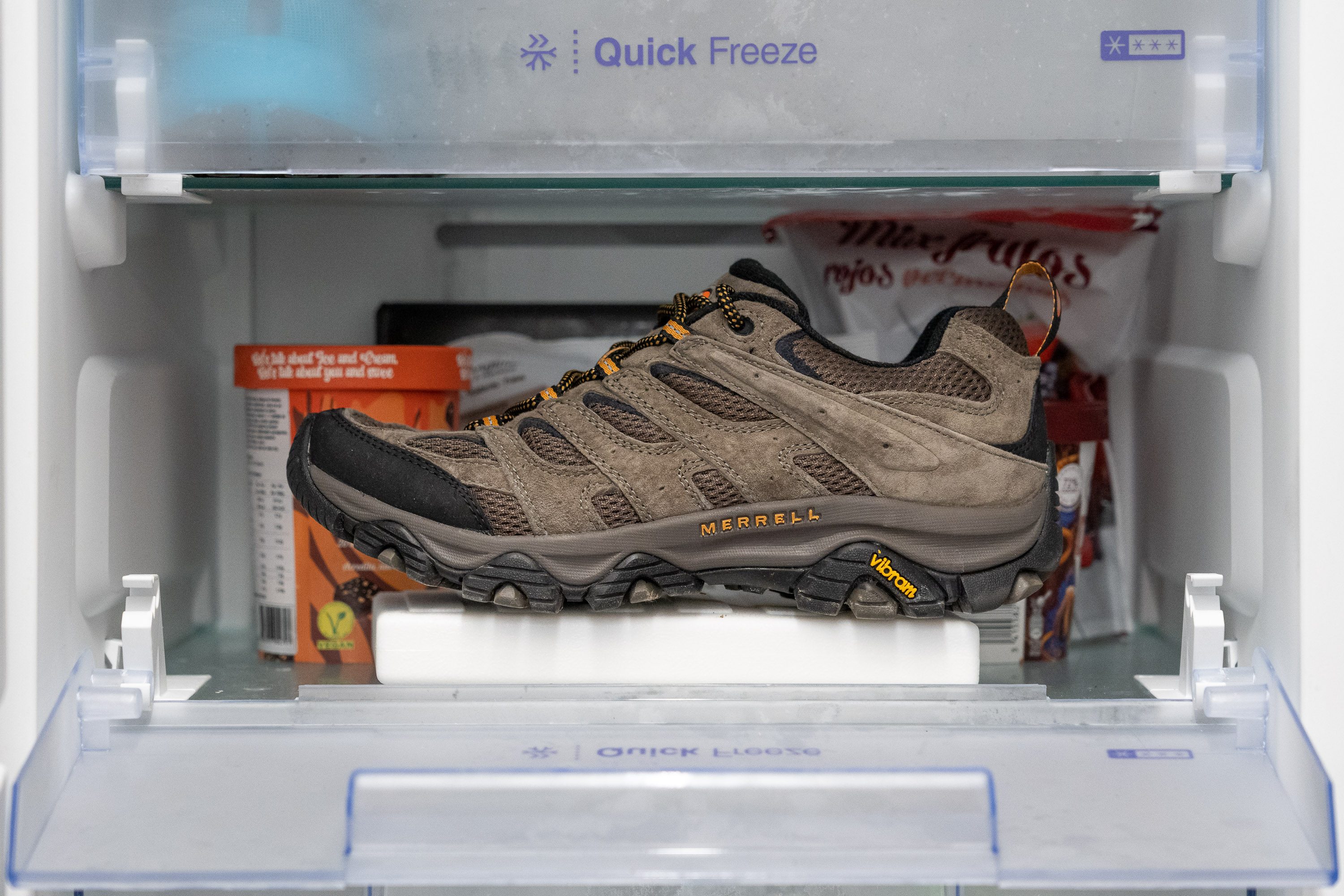
And this Merrell has proven its resilience in harsh conditions!
To our surprise, the Moab 3 got only 27.3% stiffer (less flexible), whereas most hiking shoes stiffened up by 45.8%. However, it did lose its cushioning softness more than other shoes did (23.6% over the average 20.1%).
A charmer in the areas of support and stability
When it comes to support, the Moab 3s are one of the best walking shoes we tested.
Stability-wise, the featured shoe is also a doozy. We felt like a planted tree in it. Even when we are traversing tricky terrain, this one is great for balance and stability.
It also didn't matter when we brought heavy backpacks on our hiking trips, we still didn't encounter any issues with ankle rolls or instability.
One of the major contributing factors to stability is of course the nylon shank embedded into the shoe's midsole.
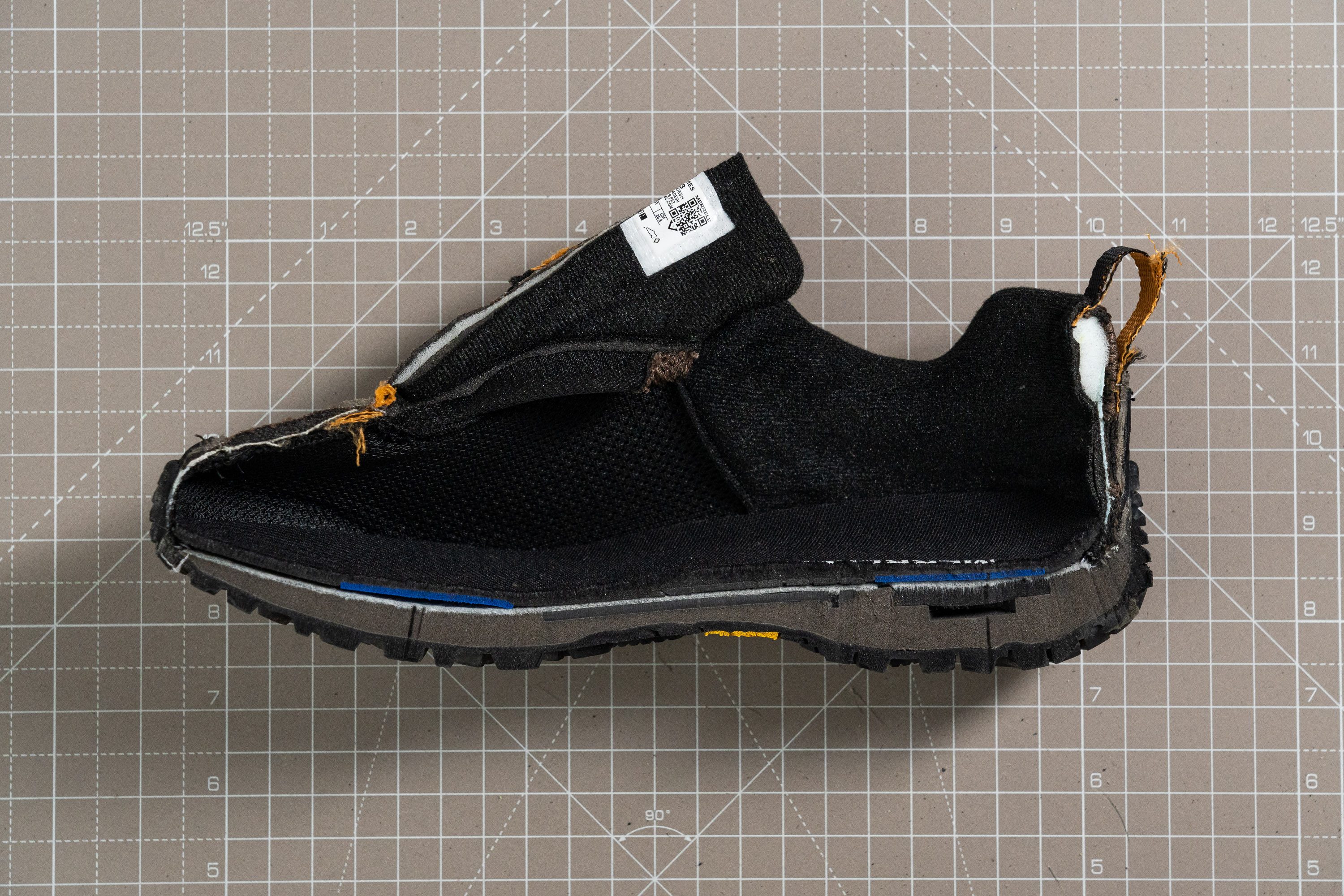
Another contributor is the shoe's nice and wide platform.
Indeed, the Merrell Moab 3 comes with a fairly wide sole. We measured the widest part of the forefoot at 108.8 mm and the widest heel part at 86 mm. Both are around 1 mm wider than average.
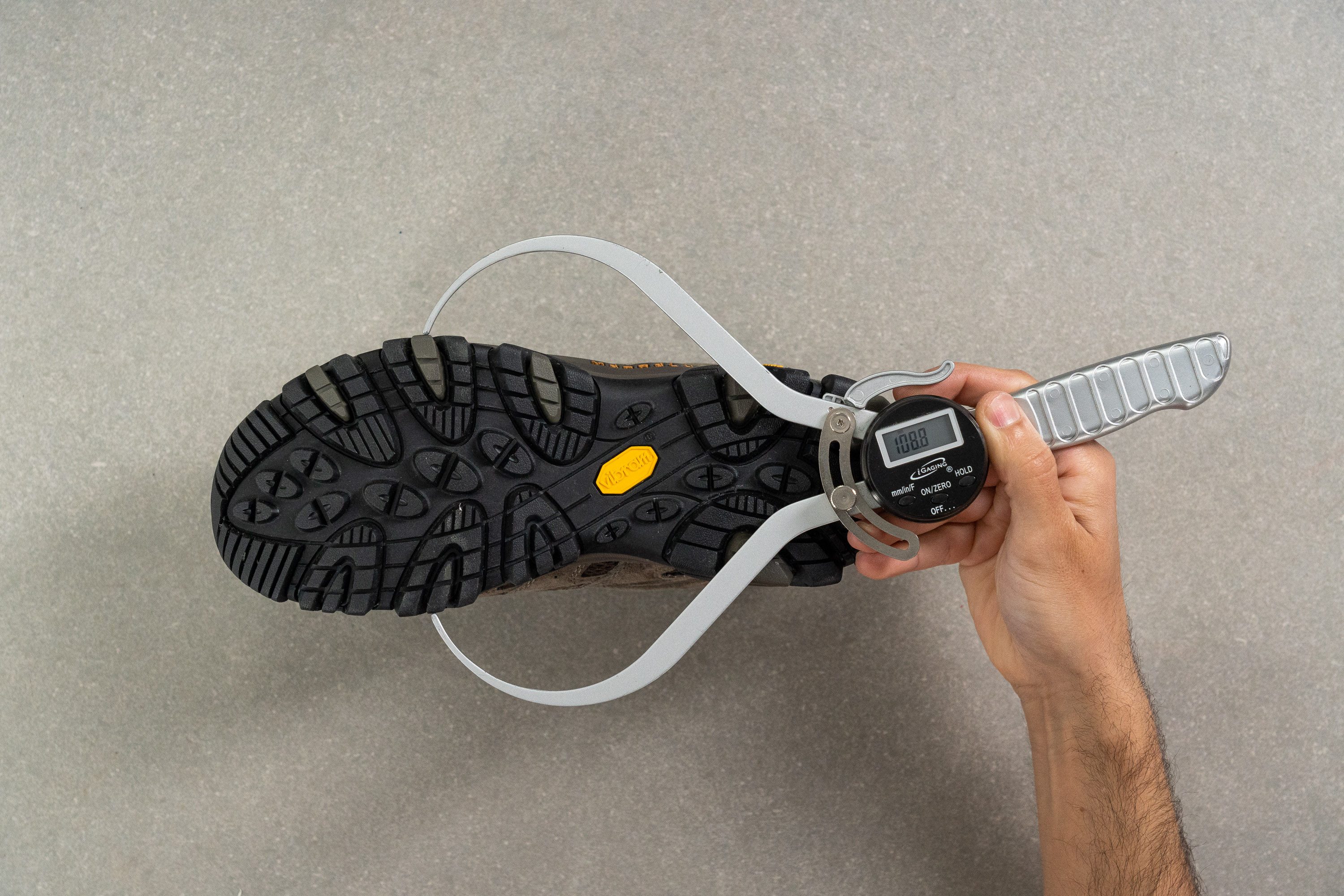
The Moab 3's secure fit
The presence of a gusseted tongue plays its part in keeping the foot in place.
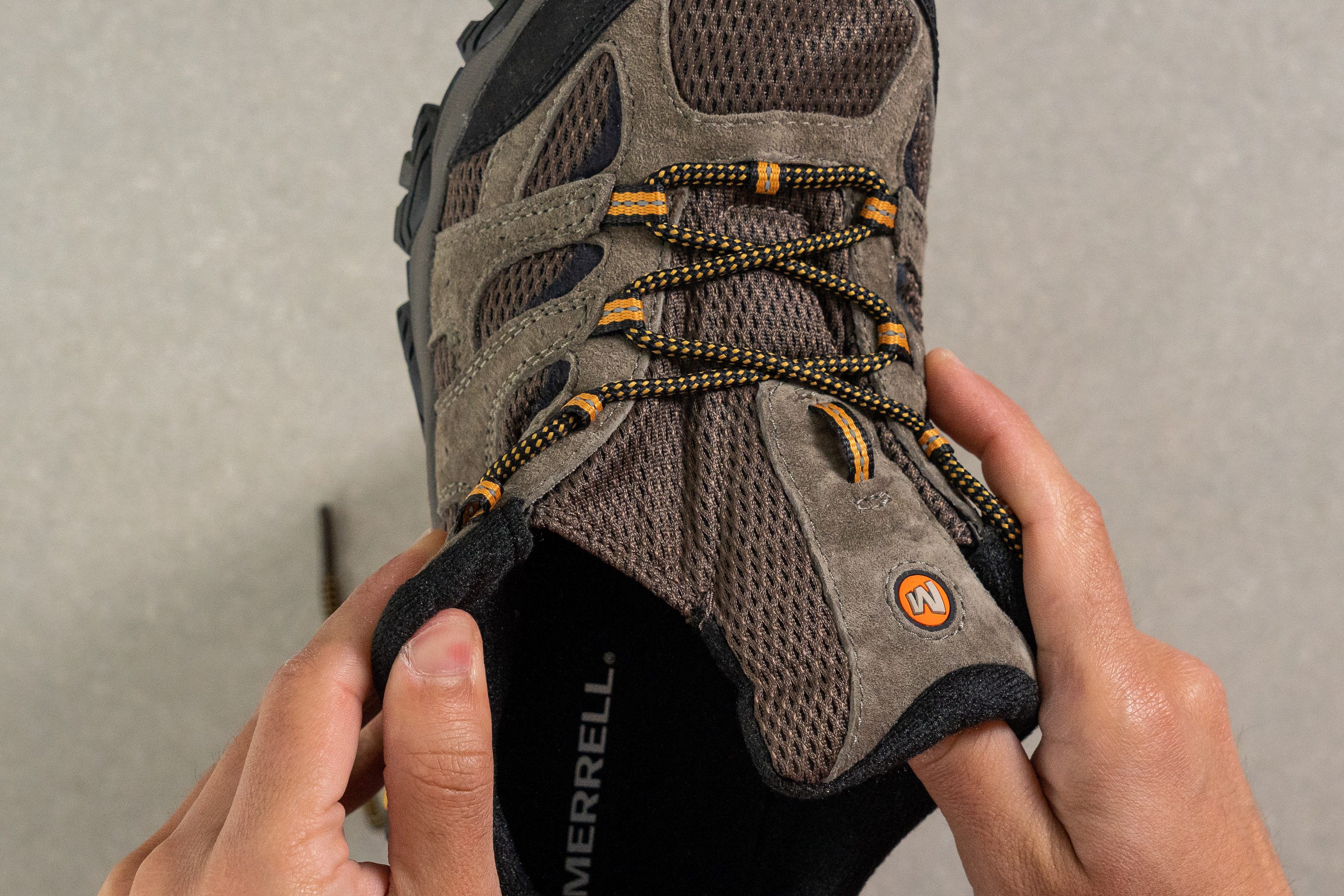
Heel slippage doesn't seem to be an issue in this hiking shoe either. It's got a medium-stiff heel counter (we rated it 3 out of 5) which has enough padding and structure to it to keep the rear foot secured.
Can make your feet look fat
We recognised that those who are used to slimmer trainers may find them too chunky for everyday wear, though.
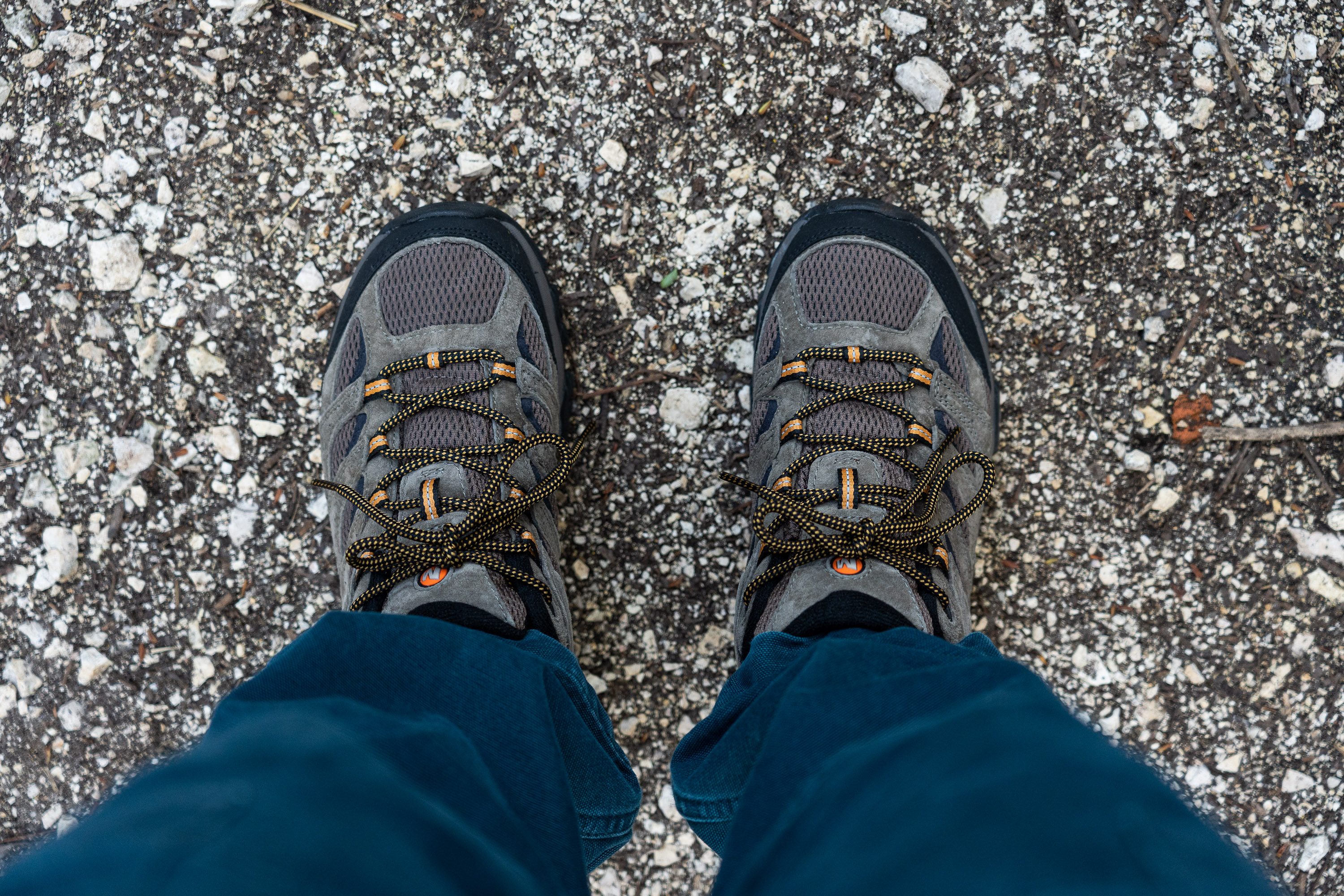
There is a price to pay for all that comfort - it's the weight
The average weight of non-waterproof hiking shoes is 12.2 oz (345g). But the Moab 3 comes with extra heft. It tips the scales at 15.3 oz (434g) per shoe in a men's US 9. Due to this, we concluded that it's not as nimble as many modern alternatives.
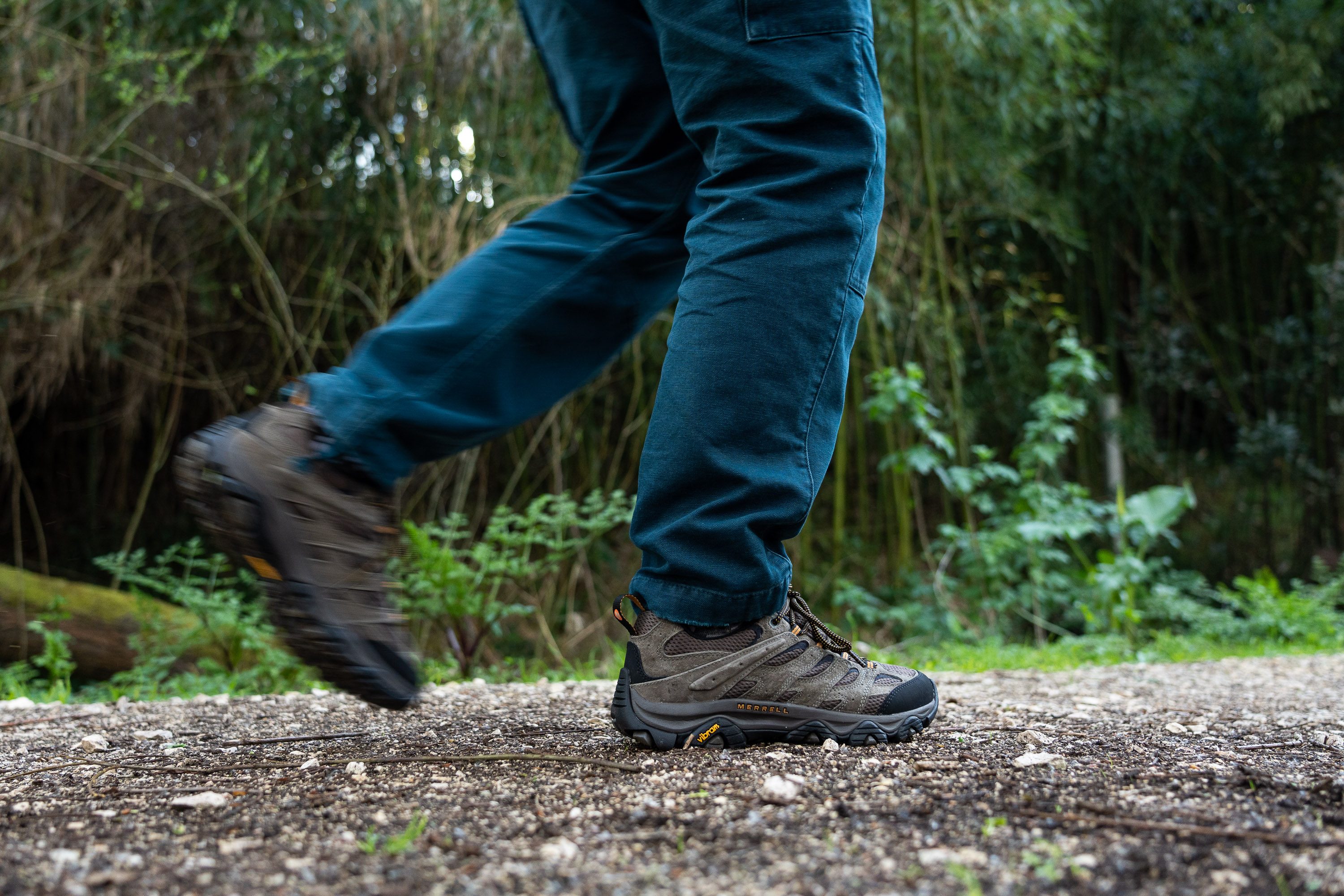
A best friend to limited budgets
With an MSRP of £110, the Moab 3 is £20 cheaper than the average price of hiking shoes (£130).
